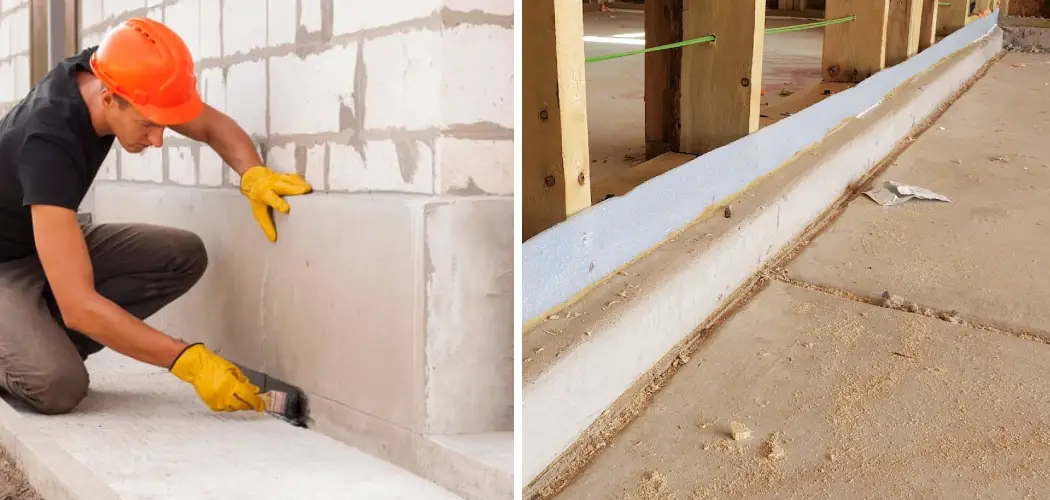Moisture in concrete walls can lead to significant problems such as mold growth, structural damage, and decreased thermal insulation. It is important to take preventative measures to avoid these issues and maintain the integrity of your building. This article will discuss some effective ways to prevent moisture in concrete walls.
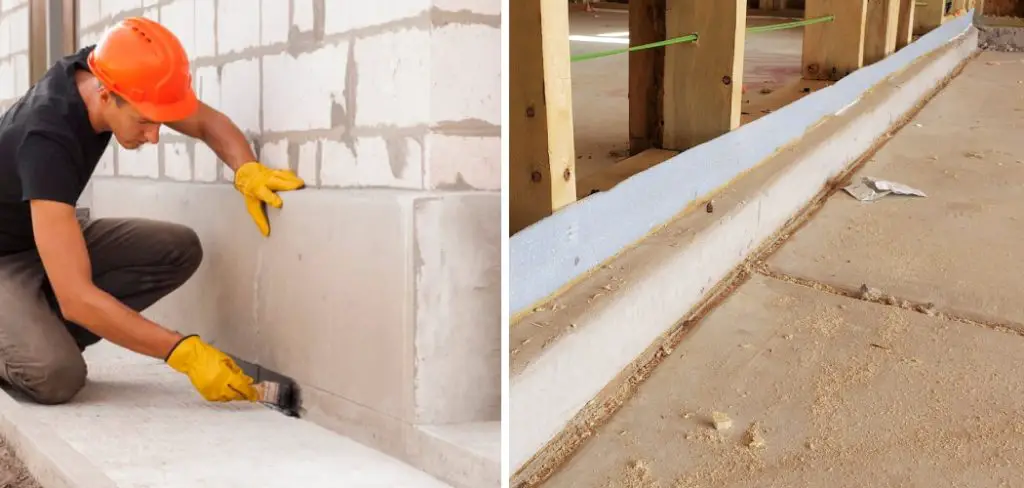
Concrete walls are commonly used in many buildings, from residential houses to commercial structures. While concrete is a strong and durable material, it can also be vulnerable to moisture damage if improperly maintained.
Moisture infiltration can cause problems for concrete walls, such as mold growth, corrosion of steel reinforcements, and concrete deterioration. In this blog post, You will learn how to prevent moisture in concrete walls.
Step-by-step Instructions for How to Prevent Moisture in Concrete Walls
Step 1: Inspect the Concrete Walls
To start, check for any visible cracks or gaps in the walls. If you do see any damage, make sure to repair them before applying any moisture prevention measures. Waterproof paint is one of the most common ways to prevent moisture in concrete walls. This type of paint creates a barrier that prevents water from seeping into the walls.
Step 2: Use Waterproof Sealant
Another way to prevent moisture in concrete walls is using a waterproof sealant. This can be applied to interior and exterior walls to create an additional barrier against water. If your building has a basement or foundation, it’s important to have a proper drainage system. This will help redirect water away from the concrete walls, preventing moisture buildup.
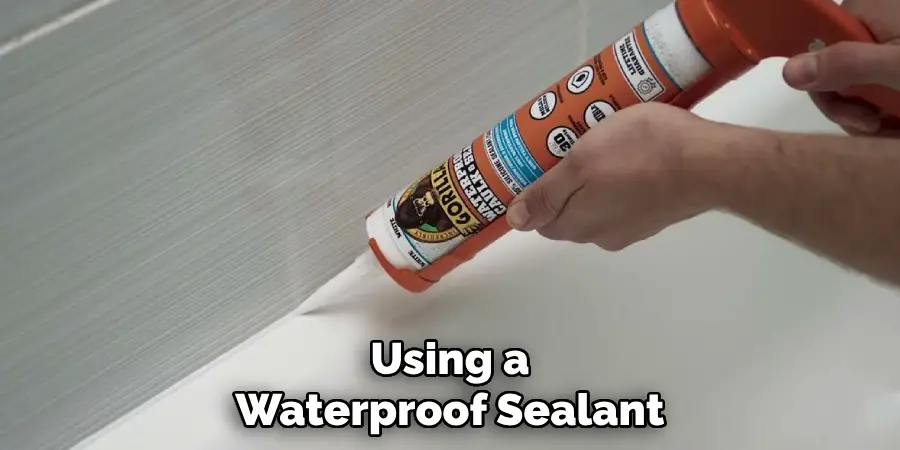
Step 3: Fix Leaks and Plumbing Issues
Any leaks or plumbing problems in your building can lead to excess wall moisture. Regularly check for and fix any issues to prevent long-term damage. Proper ventilation is key to preventing moisture in concrete walls. Install vents, especially in moisture-prone areas, such as bathrooms and kitchens.
Step 4: Install Vapor Barriers
Consider adding a vapor barrier during construction if you’re building a new structure. This will prevent water vapor from entering the walls and causing damage. In colder climates, insulation can help prevent moisture in concrete walls. It will help regulate the temperature and prevent condensation buildup.
Step 5: Use Dehumidifiers
If you live in a humid area, using a dehumidifier can help reduce excess moisture in the air and prevent it from seeping into your walls. Finally, regular maintenance is key to preventing moisture in concrete walls. Regularly inspect and repair any potential issues to keep your walls dry and in good condition.
Following these steps can effectively prevent moisture in concrete walls and avoid potential problems. Remember to regularly inspect your walls and address any issues promptly to maintain the integrity of your building.
Safety Precautions for How to Prevent Moisture in Concrete Walls
- A vapor retarder is an essential material that helps to prevent moisture from entering concrete walls. It is installed between the concrete and the insulation, acting as a barrier to keep water and moisture at bay.
- Installing a proper drainage system around your home can help to divert rainwater away from your foundation and prevent it from seeping into your concrete walls.
- Regularly inspecting and maintaining the gutters and downspouts can also play a crucial role in preventing moisture from entering your concrete walls. Clogged or damaged gutters can cause water to overflow and accumulate around the foundation, leading to moisture issues.
- Cracks and gaps in the concrete walls can provide an entry point for moisture. Sealing these openings with a waterproofing compound or caulk is essential to prevent water from seeping in.
- Properly grading the ground around your home can also help prevent moisture issues in concrete walls. The ground should slope away from the foundation, allowing water to flow away and not collect near the walls.
- In regions with high humidity levels, using a dehumidifier can help reduce air moisture and prevent condensation on interior concrete walls. This can also help prevent mold growth and other water-related issues.
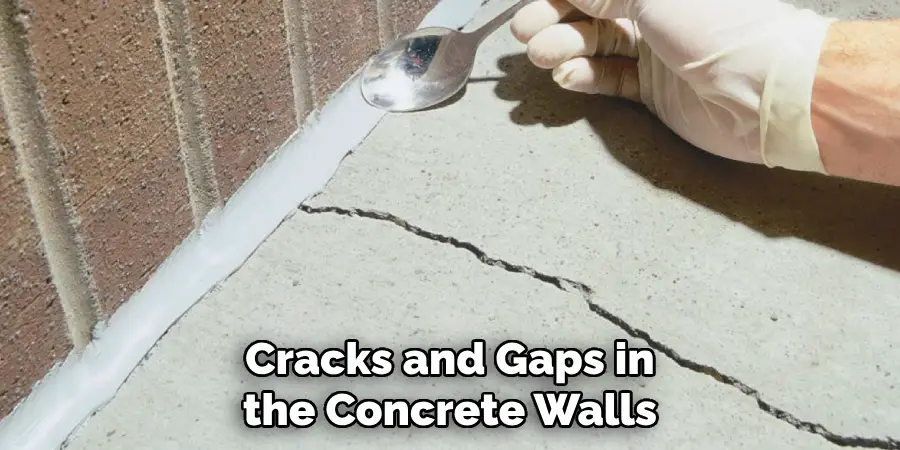
Remember, prevention is always better than fixing the problem after it has already occurred. By following these safety precautions, you can maintain dry and durable concrete walls for your home.
What is the Main Cause of Moisture in Concrete Walls?
Excessive moisture in concrete walls can be a major cause of concern for homeowners and building owners alike. If left unchecked, it can lead to various problems, such as mold growth, damage to the structural integrity of the building, and even health hazards. It is, therefore, important to understand the main cause of moisture in concrete walls to prevent it from happening.
The primary cause of moisture in concrete walls is water in the surrounding environment. This can be due to various reasons, such as high humidity levels, heavy rainfall, or inadequate drainage systems. When water comes into contact with concrete walls, it can seep through tiny cracks and pores in the material and cause damage over time.
In addition to external factors, poor construction practices can also contribute to moisture in concrete walls. This includes insufficient waterproofing measures, improper installation of drainage systems, and lack of proper ventilation.
Importance of How to Prevent Moisture in Concrete Walls
1. Protecting the Structure of Your Building
Moisture can weaken the structural integrity of concrete walls, leading to cracks and other damage. By preventing moisture, you can ensure the durability and stability of your building.
2. Avoiding Health Hazards
Excess moisture can create a breeding ground for mold and mildew which can cause health issues such as allergies, asthma, and respiratory problems. By preventing moisture, you can maintain a healthy living environment.
3. Preventing Costly Repairs
Fixing moisture issues in concrete walls can be expensive and time-consuming. By taking preventive measures, you can save yourself the hassle and cost of repairing damage in the future.
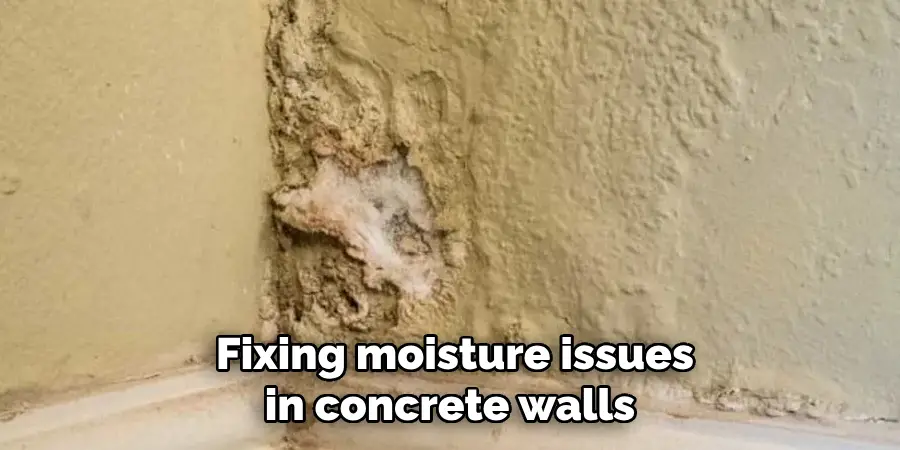
4. Maintaining Aesthetics
Moisture can lead to unsightly stains and discoloration on concrete walls, affecting the overall appearance of your building. By preventing moisture, you can maintain the aesthetic appeal of your property.
5. Increasing Property Value
A well-maintained building with dry and durable concrete walls can increase its value in the real estate market. Preventing moisture issues helps preserve the value of your property for years to come.
Taking the necessary precautions to prevent moisture in concrete walls is crucial for maintaining a safe, healthy, and durable building. So, it is important to follow these steps and safety precautions to ensure the longevity of your concrete walls.
Common Mistakes While Preventing Moisture in Concrete Walls
1. Improper Curing
One of the most common mistakes that can lead to moisture in concrete walls is improper curing—concrete needs to be cured properly to achieve its full strength and durability. If the concrete is cured for sufficient time, it will have strong spots and porosity, making it more susceptible to moisture infiltration.
2. Poor Drainage Around the Foundation
Another common mistake is poor drainage around the foundation of the concrete walls. If there is no proper drainage system, water will accumulate around the base of the walls and seep through any cracks or imperfections.
3. Lack of Vapor Barrier
A vapor barrier is essential in preventing moisture from entering through concrete walls. This thin material layer shields the concrete and the surrounding environment, preventing moisture from seeping through.
4. Insufficient Waterproofing
Waterproofing often needs to be given more attention when constructing concrete walls. This can result in water seeping through cracks or wall gaps, leading to moisture buildup.
5. Incorrect Choice of Sealants and Coatings
Choosing the wrong type of sealants or coatings can also contribute to moisture problems in concrete walls. It is important to use sealants and coatings specifically designed for concrete, as other types may not be compatible with its unique properties.
6. Lack of Proper Ventilation
Proper ventilation is crucial in preventing moisture buildup in concrete walls. Without proper airflow, condensation can form on the surface of the walls, leading to moisture infiltration.
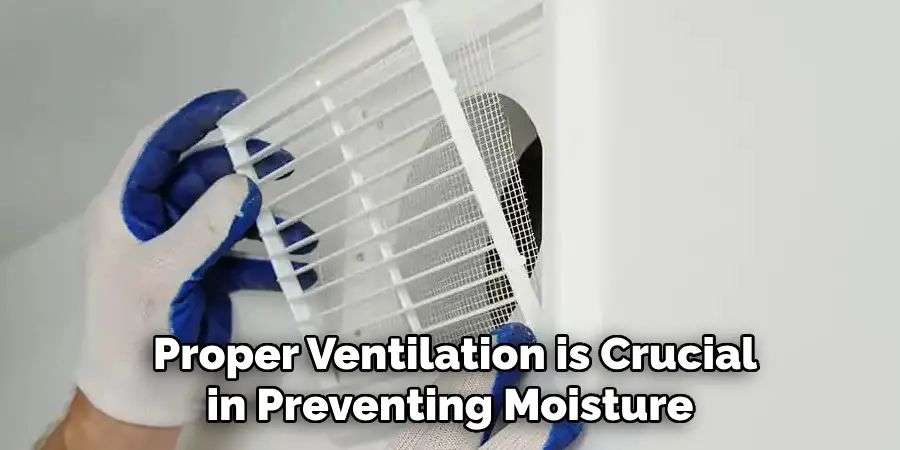
Poor quality materials: Lastly, using poor quality materials during construction can also lead to moisture problems in concrete walls. It is important to use high-quality materials specifically designed for concrete structures to ensure their durability and resistance to moisture.
Are There Any Long-term Solutions for Preventing Moisture in Concrete Walls?
While there are many short-term solutions for preventing moisture in concrete walls, such as regular cleaning and sealing, implementing long-term preventative measures is the best way to combat this issue. These strategies not only save time and money in the long run but also ensure that your concrete walls remain structurally sound and free from moisture-related damages.
Proper construction techniques are one of the most effective long-term solutions for preventing moisture in concrete walls. When building new concrete walls, using high-quality materials and following industry-standard practices is essential. This includes installing a vapor barrier between the soil and the wall, using waterproofing membranes, and ensuring proper drainage systems.
How Does Moisture Affect Concrete Walls?
Moisture infiltration in concrete walls can have various negative effects, including:
- Cracks and Damage: Excess moisture can cause the concrete to expand and contract, leading to cracks and other types of damage.
- Mold and Mildew Growth: Moisture creates the perfect environment for mold and mildew growth, affecting the appearance and posing health hazards.
- Efflorescence: This white powdery substance forms on the surface of concrete due to moisture. It can affect the appearance and durability of the walls.
- Corrosion: Moisture can cause rebar and other metal components within concrete walls to rust, weakening their structural integrity.
By understanding how moisture affects concrete walls, you can better appreciate the importance of preventing it and taking necessary precautions to ensure your walls remain in good condition.
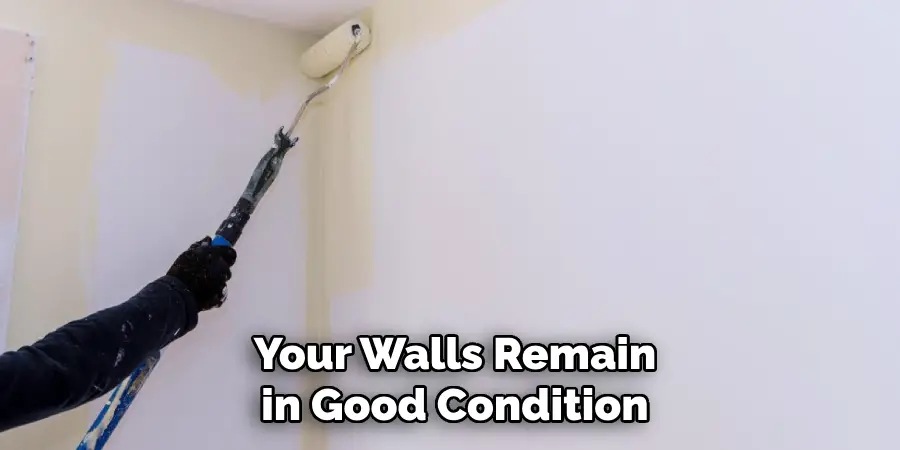
Are There Any DIY Solutions for Preventing Moisture in Concrete Walls?
Several DIY solutions can help prevent moisture in concrete walls. These solutions may not be as effective as professional waterproofing methods, but they can still provide some protection against moisture.
One common DIY solution is to apply a waterproof sealant or coating on the surface of the concrete walls. This can help prevent water from seeping into the walls and causing damage.
However, it is important to note that these sealants may need to be reapplied periodically to maintain their effectiveness. Another DIY solution is to improve the drainage around the foundation of the concrete walls.
This can involve redirecting downspouts away from the walls and ensuring proper grading of the surrounding soil. By directing water away from the walls, you can reduce the amount of moisture that comes into contact with them.
Are There Any Long-term Solutions for Preventing Moisture in Concrete Walls?
Concrete walls are commonly used in construction due to their durability and strength. However, one of the biggest concerns with concrete walls is moisture intrusion. When moisture seeps into concrete walls, it can lead to problems such as mold growth, material degradation, and structural damage. Therefore, it is crucial to prevent moisture from entering concrete walls to maintain longevity and stability.
There are various short-term solutions for preventing moisture in concrete walls, such as using sealants or waterproof coatings. While these methods may provide temporary relief, they are short-term solutions and may require frequent reapplication.
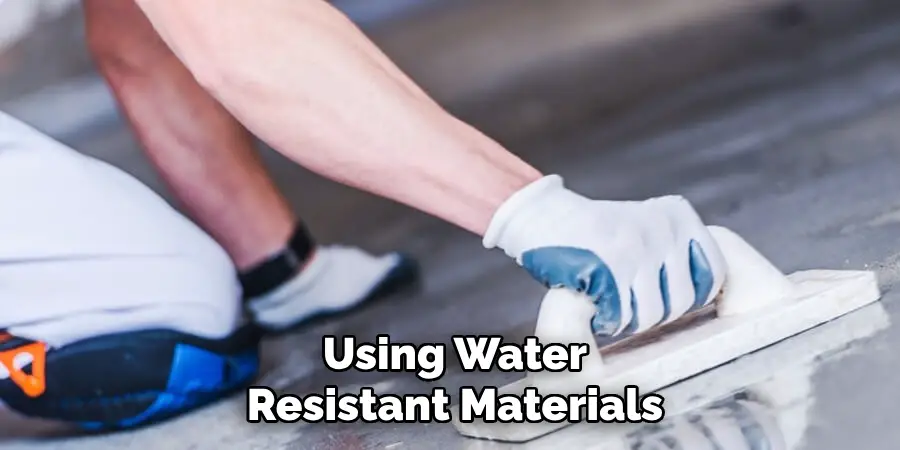
The first step towards preventing moisture intrusion is proper construction practices. This includes using water-resistant materials, proper drainage systems, and ensuring a solid foundation. These measures can help create a barrier against moisture and prevent it from entering the concrete walls.
Conclusion
In conclusion, moisture in concrete walls is a common problem that can lead to serious damage if left unchecked. However, following the steps outlined in this blog post, you can effectively prevent moisture from seeping into your concrete walls.
This includes proper construction techniques, using waterproofing products and sealants, and implementing preventative measures such as proper drainage and ventilation.
Remember, proper prevention is key to avoiding costly repairs and maintaining the structural integrity of your concrete walls. This article has been beneficial for learning how to prevent moisture in concrete walls. Make Sure the preventive measures are followed chronologically.
I am Rick. I grew up helping my dad with his handyman service. I learned a lot from him about how to fix things, and also about how to work hard and take care of business. These days, I’m still into fixing things- only now, I’m doing it for a living.
I’m always looking for new ways to help people grow and develop. That’s why I have created this blog to share all my experience and knowledge so
that I can help people who are interested in DIY repair.

